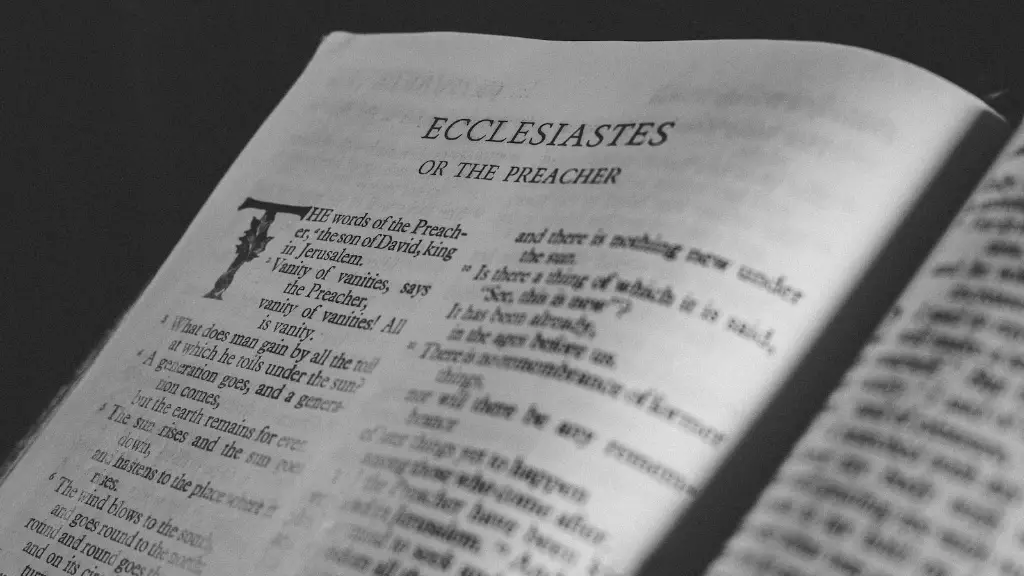40, a seemingly insignificant number, has variety of important Biblical interpretations, both symbolically and numerically, that are written into the Bible and carried out through man’s understanding of its fulfillment. This number is significant and has entranced people since the dawn of creation. It is written into scripture and referenced numerous times throughout man’s history. Understanding why 40 is significant and how it has been a reference point throughout the Bible sheds light and importance to this mysterious number.
Mathematically and symbolic, 40 is considered a ‘completion number.’ It represents the number of complete units. For example, in some cultures and societies, the complete number of days of a trial or journey must sum up to 40. When looking through the Bible, the phrase “forty days” is brought up numerous times. An example of this can be seen in the story of Jesus and the temptations as he spends forty days and nights in the Wilderness. Here, Jesus experiences the trial and tribulation of the temptations and completes them in the fullness of forty days.
In the Bible, other stories also have God providing forty days of grace and testing. Noah was instructed by God to build the ark and was given forty days of warning before the floods began. He was the sole receiver of such grace that was given to him by God. Additionally, Moses was tasked at Mount Sinai to produce the Ten Commandments, which reappeared after a forty-day period. This list of commandments is still carried out and followed today as the foundation of living a moral life.
The Bible also speaks of forty-year periods. This number is associated with man’s testing of faith and endurance. An example of this is displayed in the story of the Israelites who were in the wilderness for forty years after escaping the Egyptian oppression. Although their physical journey lasted forty years, their spiritual journey of understanding what it meant to be devoted to God was much more intense.
The number of forty also has its presence in the life of Jesus. Not only was Jesus tempted in the wilderness for forty days and nights, but he also spread his ministry and teachings over forty days before ascending to Heaven when his mission was complete. This shows how God sent Jesus to give people guidance on how to live a righteous and kind life.
The Significance of the Ark of the Covenant
According to God’s instructions, the Ark of the Covenant was to remain in the holiest space of the Tabernacle for forty days. The Ark of the Covenant served as a transportable chest, which contained the tablets of stone, Aaron’s rod and a pot of manna. This was to be the place where man could commune with God. During this span of forty days, it was only the Cohen, the term for priest in the Bible, who could directly speak to him through the Ark of the Covenant.
Forty-Day Periods of Pregnancy
In the Bible, there are many examples of forty-day periods in regards to pregnancy. For instance, the age of a child at birth is determined by a forty-day period. In other references, a woman’s period of ‘purification after childbirth’ was also written to be forty days. In the eyes of God, there is something complex and mysterious in the things that happen in 40-day intervals.
40 Years between David and Solomon
When looking back in the Bible, there is a forty-year span between the reigns of King David and his son, King Solomon. This is incredibly significant because it is believed to be a time of transition for the Jewish people, as it was during this forty-year period that their nation became prosperous. Additionally, it was also during this span of years when the kingdom was divided into two nations, with King Solomon on the throne of Judah and his nephew, Jeroboam, ruling over the kingdom Israel.
Conclusion from the Prophet Elijah – Forty-Day Fasting
The forty-day fast performed by Elijah, in which he traveled to mount Horeb, is an example of strength and faith in God, who delivered answers one week after Elijah had abstained from eating food or drinking water. Upon finishing the forty days, God appeared and spoke to Elijah, who then proceeded to begin another task upon the Lord’s desire. This act of faith has been seen throughout the Bible in relation to this forty-day period.
In Summary
Through this text, we can see how 40 is of utmost importance to the Bible. This number appears numerous times and has been a beacon of faith and hope for many. The number itself speaks about the completeness in man’s journey, as well as the understanding of God’s will and ways throughout our lives.
Religious Relevance
The Bible references the number forty many times and its significance has been widely accepted by religious scholars and followers throughout the world. For example, during Lent, many Christians abstain from eating certain foods for forty days as a way to remind themselves of this number’s importance. For Muslims, the individuals who make the Hajj pilgrimage to Mecca also follow the story of Abraham, who was also asked by God to give a sacrifice after forty days.
Comparison to other Sacred Texts
40 has a significant presence in other sacred texts as well. In Hinduism, the Hindu god, Shiva, stayed in meditation for a total of forty days. Other religious stories of Greek mythology, such as the twelve labours of Hercules, which were completed in a span of forty days and forty nights, depict this mysterious number as strongly connected to strength.
Cultural Influence and Meaning
The number forty has been carried through generations and has inspired several worldwide traditions. This can be seen in Ramadan, in which Muslims are required to fast for forty days and nights to honor this number. Additionally, many cultures still adhere to a forty-day period for the completion of certain tasks, such as jury duty. Although in modern times this number has been diminished and lost its strong presence, its importance will always remain the same in relation to the Bible.
Forty Days of Cleansing and Atonement
In the Bible, forty days bring out the idea of cleansing and atonement. It was believed that during these forty days, an individual had the opportunity to worship and repent for their sins. This would be completed in a process of self-cleansing, which would ultimately bring the individual closer to God. This concept is relevant to multiple religions worldwide, and is still practiced today.
Symbolic Representation
The symbolic representation of forty is important because it speaks of a type of completeness, as well as a long, transformative period of time. It is a representation of rebirth and renewal. It symbolizes the idea that putting in the effort and commitment to a task will bring forth the fruits of your labor. In terms of the Bible, this number brings forth a sense of hope, healing and transformation that are a part of the Christian faith.



